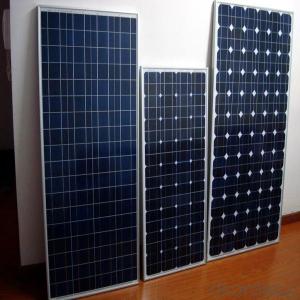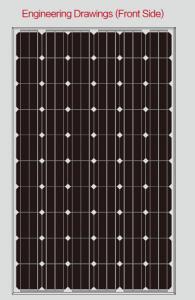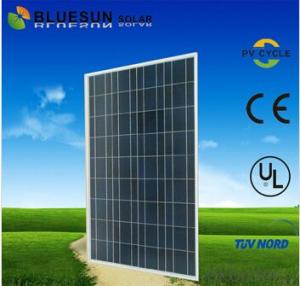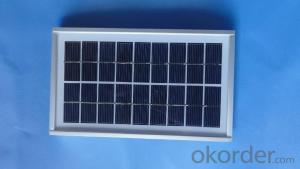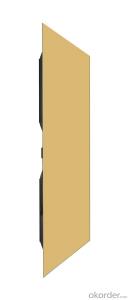120W Mono Solar Panel Made in China for Sale
- Loading Port:
- Shanghai
- Payment Terms:
- TT OR LC
- Min Order Qty:
- 1000 watt
- Supply Capability:
- 1000000 watt/month
OKorder Service Pledge
OKorder Financial Service
You Might Also Like
Item specifice
Product Description
Solar module/panel with high efficiency solar cells
Strong, lightweight aluminum frame design with reinforced sealing and load hold to prevent freezing and warping, and stand against high wind.
Under Standard Test Conditions(STC): Irradiance of 1000W/m2, Am1.5 and 25º C cell temperature.
Mechanical Characteristics
Dimensions: 670mm(L) x 1150mm(W) x 35mm(H)
Weight: 12.5kg
Solar Cells: Polycrystalline solar cells, 36 cells
Construction: Front: High-transmission 3.2mm tempered glass; Encapsulate: EVA; Back: TPT
Frame: Clear anodized aluminum alloy Color: Silver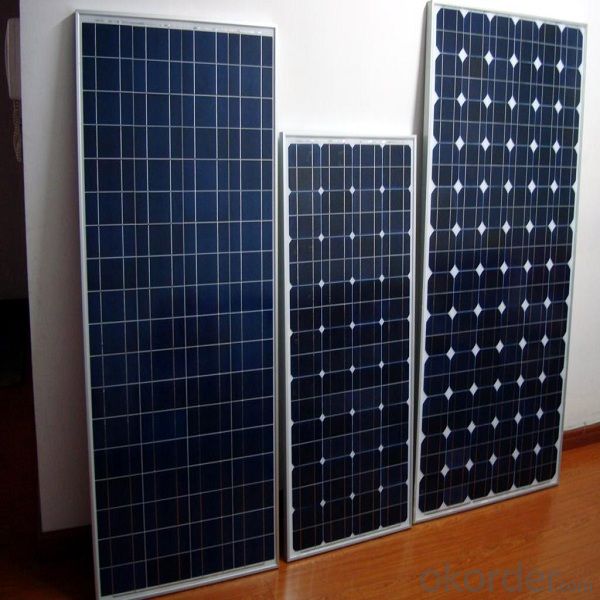
Product features:
1. The modules use high-quality imported polycrystalline or monocrystalline solar cells;
Enclosed by high-rigidity tempered glass, with excellent light transmittance and output performance;
2. Surface treated with reflection-reducing process, increasing the light absorption.
Back sealed with anti-aging EVA, resistant from moisture and corrosion.
3. The efficiency of our monocrystalline solar cell is over 17%, and polycrystalline panel is over 16%. We stipulate, the allowance of each panel's rated power has to be positive. Each panel is strictly tested before leaving the factory.
4. Our solar panel is designed with a lifetime of 25 years, and guaranteed that the power decline less than 10% within 10 years, and 20% within 20 years.
| Performance | |
| Rated Power[Pmax] | 120W |
| Power Tolerance | ± 5% |
| Nominal Voltage | 17.21V |
| Design Life | 25 years |
| Electrical Characteristics | |
| Maximum Power [Pmax] | 120W± 5% |
| Maximum Power Voltage [Vmp] | 17.21V± 3% |
| Maximum Power Current [Imp] | 6.97A± 3% |
| Short-Circuit Current [Isc] | 7.71A± 3% |
| Open-Circuit Voltage [Voc] | 21.96V± 3% |
| Current Temperature Coefficient | 0.08%/º C |
| Voltage Temperature Coefficient | - 0.32%/º C |
| Power Temperature Coefficient | -0.38%/º C |
- Q:How do solar panels affect home insurance rates?
- Solar panels can potentially have a positive impact on home insurance rates. While the initial cost of installation may increase the overall value of a home, insurance companies often offer discounts or special policies for homes equipped with solar panels due to their reduced reliance on traditional energy sources and increased energy efficiency. However, it is recommended to consult with insurance providers to determine the specific impact on rates as it may vary depending on the location, type of system, and other factors.
- Q:im aware i dont fully understand. but with what i do. if P = iv, and current changes with voltage, whats the point of changing either. if in any cicumstance, you end up with the same wattage, how does changing either effect a solar setup. (2v panel vs 24v)thanks in advance. explain in laymans if you can.
- The choice of solar panel voltage comes down more to what the panels will be connected to. You're right that power can remain the same at the different voltages. Higher input (panel) voltages are sometimes used in inverter systems to reduce the effect of voltage draw-down. 2v panels (about 20v open circuit) work well for charging 2v batteries, connected in parallel, through a charge controller. For use of a grid-tie inverter, higher input voltages are sometimes used to reduce the effects of draw-down. You want to select and wire (parallel vs. series) your panels based on the input voltage requirement of the load, whatever it may be.
- Q:What do these mean? I'm interested in doing a solar panel project. The problem is I know nothing about electricity, wiring, or panels so I've bought a small panel to experiment with first.I don't know what amps, watts, or volts are; what I should be reading on the batteries I will be charging? Or on the small appliances I will be running?The panel I bought has four settings:. 3V ---- 200mA2. 6V ---- 00 mA3. 9V ---- 50mA4. 2V ---- 50 mA(What is mA?)Also, will you give examples of what I can run with this? Make up any scenarios with whatever amps/volts/watts.
- . 3V 200mA. mA (milliAmp) = 0.00A; Power = 3V x 0.2A = 0.6 Watts. 2. 6V 00mA is 6 x 0. = 0.6 Watts. 3. 9V 50mA is 9 x 0.05 = 0.45 Watts. 4. 2V 50mA is 2 x 0.05 = 0.6 Watts. With the 3 Volts one you could connect it to a flashlight light bulb, that's is about the max you can get out of it. With the light bulb, polarity doesn't matter, but if you power a small transistor radio with it, then make sure the + goes to the + and the - to the -. Reversing it wouldn't work and in some cases you could damage equipment.
- Q:Due to erratic power cuts in my area I want to make up by using a 30watt solar panel. My decoder is 30watt but my TV is 70W. I need something small. I don't have problem with sound. Just picture.
- Do what we do when power is cut (although we have very reliable power - we loose as much as 2 hours a year), is go Amish. That is go without powered technology. Now, for you, you need more than a solar panel (and likely more than 30W, but that is a start) - you need a battery or set of batteries to store the collected power. 20Ah might do. You need an inverter to power things. For that, likely a 300W will do. For a TV, go shopping, and look at the labels on the back of the TVs. I just bought a 24 TV rated at 40W. If you get a 9 LED TV, it may be likely you can run that directly from battery, for many have separate DC brick supplies. With those, you can make a cable to power it directly from a 2V or so battery, if the supply can make 2 to 5V. Depending on your provider, you may be able to get a mini-decoder which uses a separate brick or wall supply, which means the decoder likely can be directly battery powered. Such a decoder may draw less than 20W.
- Q:Can solar panels be used to power a water treatment plant?
- Yes, solar panels can be used to power a water treatment plant. Solar energy can be harnessed to generate electricity, which can then be used to operate the various processes and equipment involved in water treatment. The energy generated by solar panels can be stored in batteries for use during non-sunny periods, ensuring a consistent power supply for the water treatment plant. Additionally, solar power can help reduce the carbon footprint of the water treatment process, making it more environmentally friendly.
- Q:Can solar panels be installed in areas with high winds?
- Yes, solar panels can be installed in areas with high winds. However, it is important to design and install the solar panel system with wind load considerations. Proper anchoring and structural support should be implemented to ensure the panels can withstand strong winds without causing any damage.
- Q:Can solar panels be installed on a prison or correctional facility?
- Yes, solar panels can be installed on a prison or correctional facility.
- Q:Can solar panels be used on vehicles?
- Yes, solar panels can be used on vehicles. They can be installed on the roofs or hoods of cars, trucks, and even boats to harness solar energy and charge the vehicle's battery or power various electrical systems. This helps reduce reliance on fossil fuels and make vehicles more sustainable and energy-efficient.
- Q:For those solar panels that you install on your rooftops, do they generate electricity when it's cloudy? And if yes, how much electricity does it generate compared to sunny days? For example...like only 25% electricity generated compared to sunny days?
- From my understanding they generate electricity when the suns out and when its out and there aren't too many clouds around covering up. They store some electricity for the winter and cloudier times but I'm not really an expert!
- Q:Can solar panels be used in areas with high winds?
- Yes, solar panels can be used in areas with high winds. However, it is important to ensure that the solar panel installation is designed and built to withstand the specific wind conditions of that area. This may involve using appropriate mounting systems, securing the panels properly, and considering the orientation and tilt angles. Additionally, selecting high-quality materials and conducting regular maintenance can help ensure the longevity and performance of the solar panels in high wind areas.
1. Manufacturer Overview |
|
|---|---|
| Location | |
| Year Established | |
| Annual Output Value | |
| Main Markets | |
| Company Certifications | |
2. Manufacturer Certificates |
|
|---|---|
| a) Certification Name | |
| Range | |
| Reference | |
| Validity Period | |
3. Manufacturer Capability |
|
|---|---|
| a)Trade Capacity | |
| Nearest Port | |
| Export Percentage | |
| No.of Employees in Trade Department | |
| Language Spoken: | |
| b)Factory Information | |
| Factory Size: | |
| No. of Production Lines | |
| Contract Manufacturing | |
| Product Price Range | |
Send your message to us
120W Mono Solar Panel Made in China for Sale
- Loading Port:
- Shanghai
- Payment Terms:
- TT OR LC
- Min Order Qty:
- 1000 watt
- Supply Capability:
- 1000000 watt/month
OKorder Service Pledge
OKorder Financial Service
Similar products
New products
Hot products
Related keywords
